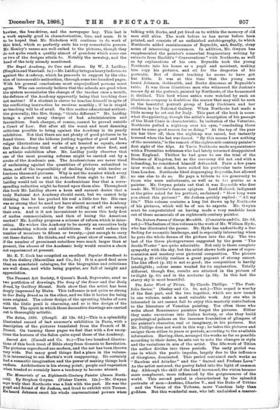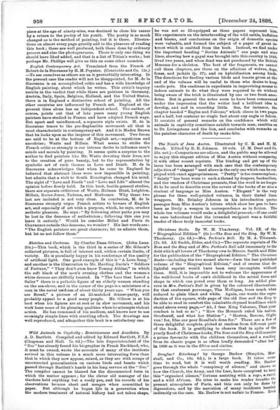The Later Work of Titian. By Claude Phillips. "The Port-
folio Series." (Seeley and Co. 9s. net.)—This sequel is worthy of the first part, and the two together, which are now issued in one volume, make a most valuable work. Any one who is interested in art cannot fail to enjoy this masterly contribution to the literature of Venetian painting. Too often those who write about Renaissance painters forget the pictures. Either they make excursions into Italian history, or else they build psychological palaces on the insecure foundation of glimpses of the painter's character, real or imaginary, in his pictures. But Mr. Phillips does not work in this way ; he takes the pictures and assigns them either to years or periods, according to the available information. Having, then, arranged the works as far as possible according to their dates, he sets out to note the changes in style and the variations in aim of the artist. The life-work of Titian the author divides into three periods. The early period was one in which the poetic impulse, largely due to the influence of Giorgione, dominated. This period contained such works as "Bacchus and Ariadne" and the "Sacred and Profane Love." As the artist matured, the poetry faded into the light of common day. Although the skill of the hand increased, the vision became more complacent, more influenced by the gorgeousness of the world. This second period is characterieed by the splendid portraits of men—Arebino, Charles V., and the Duke of Urbino and the -Venus of the Tribune, more Venetian lady than goddess. But this wonderful man, who left unfinished a master.
piece at the age of ninety-nine, was destined to close his career by a return to the poetry of his youth. The poetry is as much changed as is the method of painting, but it is there. Illustra- tions on almost every page greatly add to the pleasure of reading this book ; these are well produced, both those done by ordinary process and also the photogravures. There is only one thing we should have liked added, and that is a list of Titian's works ; but perhaps Mr. Phillips will give us this on some other occasion.







































 Previous page
Previous page